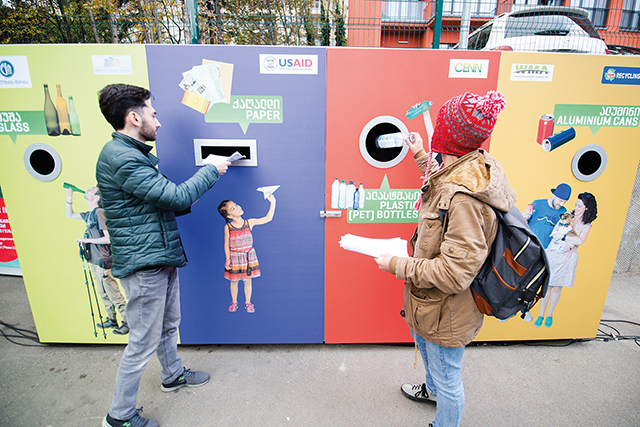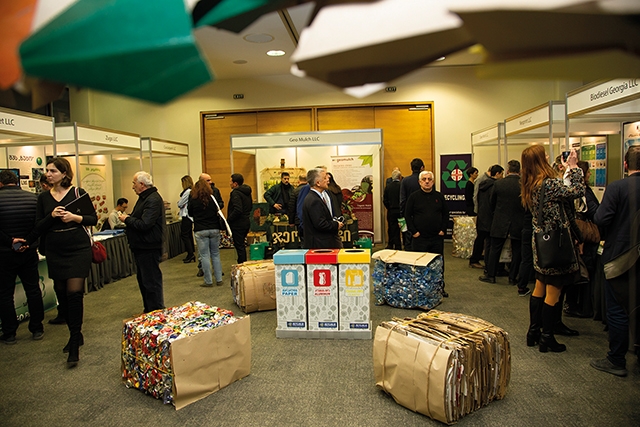'Development of Waste Management Sector Can Create More Job Oportunities'
Over the past year, GEORGIA TODAY has been actively covering issues related to environmental protection, particularly waste management and environmental pollution on the one hand to raise people’s awareness about their polluting habits, and on the other to let our readers know what they can do to contribute their share to protecting the environment. GT has been working in partnership with CENN/USAID’s Waste Management program, a program that has ensured novel steps toward reducing waste, starting a sustainable recycling system and putting the right policies in place for a safer and more responsible environment for all. The month of March marks the end of this six-year program and today we take a look back at the key milestones achieved in how waste is managed and how the country’s journey began in transforming its resource management, something that affects us all. For this, we spoke with Solomon Pavliashvili, the Deputy Minister of the Environmental Protection and Agriculture, Doctor of Economic Sciences, Vice President of the Georgian Academy of Economics, Paata Gugushvili Prize Laureate; and Nana Janashia the Executive Director of CENN, the leading environmental NGO.
What are the significant developments in the waste management sector in the country?
Solomon Pavliashvili: Georgia has very high standards of environmental policy, and thus the country has developed a number of strategies and action plans, among them the Waste Management Codex, National Strategy for Waste Management 2016-2030, the National Action Plan 2060-2020 and the National Program for the Environmental Protection for 2017-2020.
In order to effectively implement the abovementioned policy documents, several technical regulations and bylaws have also been developed on issues such as waste import, export and transit as well as regulations on plastic and biodegradable bags, which is a huge topic at the moment due to the excess use of plastic bags.
The standards set for landfills, how they are built and operated, are an important aspect for the country. Complying with these standards means protecting citizen’s health and preventing the negative effects on the environment.
A complete revolutionary step forward in the waste management sector will be the introduction of the Extended Producer’s Responsibility (EPR), which is based on “the polluter pays principle”. This approach ensures the producers, sellers and distributors are held responsible for managing the waste produced by their products. This means that besides protecting the environment, additional job opportunities will be created.

What has been achieved against the targets of the EU Association Agreement? How?
All the above-mentioned documents are in line with the European standards. Thus, Georgia is ready to implement a model that is in line with the EU Association Agreement.
The introduction of EPR, which will take place in the near future, will ensure that specific types of waste will be collected and recycled. This will prompt the creation of new companies in the waste management sector, which collect, process and recycle waste, and thus it will create additional work opportunities.
The establishment of waste recycling companies in Georgia is the basis for the development of a circular economy. This is exactly the type of economic model that should be a priority for our country.
Circular economy means proper management of waste flow: this entails prevention of producing waste, sorting recyclables, their subsequent collection and transportation for final recycling. This model helps reduce environmental pollution and ensures the wellbeing of our citizens. The wellbeing of our citizens is also determined by creation of more job opportunities, which the waste management sector can offer if and when the circular economy practices are gradually established.
What was the scope of cooperation with CENN?
The ministry has been working closely with CENN since 2014 in waste management, with the financial support of USAID. It was in cooperation with CENN that we developed and adopted several guidance documents and policies to support the implementation of the waste management code. The program has been actively helping the municipalities in fulfilling the obligations set by the new regulations, which was of utmost importance for the ministry as it helped implement the requirements under the legislation on the ground.
And that’s not to forget the program’s support to the private recycling sector and the establishment of the recycling system (separated waste collection) in Tbilisi and regions in cooperation with local governments.
What are the future challenges in waste management for the country?
The biggest challenge awaiting Georgia in the near future is the introduction of the Extended Producer Responsibility. All the relevant legal framework has already been developed, now it’s necessary to constructively engage the private sector in this process.
Another challenge facing Georgia is the construction of sanitary landfills that comply with the European standards.
Overall, it is important that we share this social responsibility across the government, private sector, citizens and NGOs, as caring for the environment is everyone’s responsibility.

What have been the main achievements of the waste management program?
Nana Janashia: CENN, with financial support from USAID, has been working on modernizing the waste management sector since 2014 through the program Waste Management Technology in Regions (WMTR). The program has worked very closely with the government to achieve unprecedented steps in Georgia and has managed to help the sector kick-start a major transformation that will strengthen the country’s resource management and the economy.
We started the program at a time when Georgia had no Waste Code or waste strategy, and there was no awareness of the concept of waste separation and recycling. Much has been done since then at the policy, technical and awareness levels, as well as to empower the private sector. It’s very difficult to single out specific achievements, as the list is long and all of it equally important. We probably have to start by talking about the legal framework for waste management we helped to develop. Within the program, in close cooperation with the Ministry of Environmental Protection and Agriculture, we developed a series of technical regulations in accordance with the Waste Management Code that were subsequently approved and adopted by the government. These regulations define how laws should be implemented; for example, how the country should build and operate sanitary landfills that are in compliance with the European standards and after the closure of landfills, how they should be maintained in order to minimise the negative effects of the landfills on the environment.
In addition, we developed guidelines for municipal waste management plans and even developed the municipal waste management plans for 19 municipalities, all of which were adopted. Of course, this was all relatively new to the municipalities and we decided to continue working with them to help them implement these plans. These plans basically help the municipalities design proper waste collection systems and gradually switch to waste separation and recycling. There are many steps to follow but the step-by-step plans are now in place.
Afterwards, we provided major support to the Agency of the Protected Areas (APA) of Georgia, creating the guidelines and waste management plans for three protected areas. This was particularly important for supporting the country’s tourism development.
We also shouldn’t forget the program’s role in strengthening the private recycling sector. The program established a Waste Management Association, which today unites 26 waste aggregation and recycling companies and represents a platform for lobbying the interests of the recycling sector. The program also disbursed grants to five recycling companies, with which they purchased modern equipment and increased not only their capacity but also their production.
In my opinion, one of the most important achievements was the creation of a sustainable system for separated waste collection in Tbilisi, Batumi, Kobuleti and Khelvachauri, in cooperation with the local governments and private companies. Today, citizens in those cities and towns can recycle paper, plastic, glass and aluminum in recycling bins that are available to the public. In total, there are now 47 of these recycling corners.
And this is only a modest list of the important things we achieved within the WMTR program!
Why were these milestones important?
The program has supported the country in modernizing its waste management system and contributed to helping the country implement those requirements set by the National Waste Management Code, National Strategy and Action Plan, and helped the country to meet its obligations under the EU Association Agreement.











